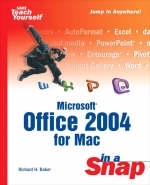
Microsoft Office 2004 for Mac in a Snap
Sams Publishing (Verlag)
978-0-672-32669-1 (ISBN)
- Titel ist leider vergriffen;
keine Neuauflage - Artikel merken
As a Mac user, you may often feel like you are in a unique world and that the programs you use are even more unique. Microsoft Office 2004 for Mac is no exception and Microsoft Office 2004 for Mac In a Snap covers all of the innovative program features. A unique random-access format makes all of these nuggets of information and advice easily and instantly accessible. Packed with more than 160 essential tasks, tips and techniques for the new Mac version of Microsoft Office 2004, this book will help you zero in on the task you're most interested in so that you can learn and get back to work.
Richard Baker has written 20 or so computer-related books¿he has lost the exact count. He also spent more than a decade as editorial director of a PC training development group, writing with, about and sometimes around the many manifestations of Microsoft Office. In a previous life he was a newspaper reporter and editorial writer. He now lives and works on what are temporarily the outskirts of Houston, Texas, with his wife Beverly, a Border Collie, two PCs, a Mac and an Osborne 1.
I. THE OFFICE PACKAGE.
1. Start Here.
What Is Office 2004?
The Office Applications.
What You See on the Screen.
2. Project Management and Scrapbooking.
Display the Project Center.
Set Up a Project.
Add Project Resources.
Share Project Resources.
Archive a Project.
Keep a Scrapbook.
Organize the Scrapbook.
Search for Clips.
3. Arts and Letters.
Retrieve Clip Art.
Add Your Art to the Gallery.
Add Your Artistic Touches.
Create a Transparent Area.
Add Text to Artwork.
Apply Artwork to Text.
4. Shaping Your Work with Templates.
Use a Template to Design a Document.
Adapt a Template to Your Needs.
Set Up a New Template.
Use an Old Document to Create a New One.
II. WORD 2004.
5. Managing Documents.
Open Files from the Project Gallery.
Live with Older Files.
Retrieve Recently Used Files.
Save Quickly and Automatically.
Manage Multiple Versions of a File.
6. Writing and Editing.
Write an Outline.
Expand Abbreviations.
Insert a Symbol.
Apply Automatic Numbers.
Insert an Excel Worksheet.
Select Multiple Items.
Select an Area.
Clear Unwanted Formatting.
Find Formatting Codes.
7. Formatting Your Work.
Apply Automatic Formats.
Select a Gallery Template.
Space and Indent a Paragraph.
Apply a Style to a New Paragraph.
Get Your Margins Out of the Gutter.
Set a Section in Multiple Columns.
Flow Text Through Multiple Boxes.
Place Graphics.
Reposition a Picture.
Wrap Text Around a Graphic.
Turn a Photo into a Painting.
8. Arranging Tables.
Insert a Table into a Document.
Apply an Automatic Format to a Table.
Apply a Style to a Table.
Add and Delete Rows and Columns.
Nest a Table Within a Table.
Add Numbers in a Column.
9. Delivering the Mail.
Generate a Form Letter.
Designate a Data Source.
Use an Address Book List As the Data Source.
Complete a Merge.
Send Letters by Email.
10. Using the Notebook.
Set Up a Notebook.
Take Written Notes.
Record Audio Notes.
Build an Outline.
Note a Task to Be Done.
Scribble a Note.
Flag Important Information.
Quickly Find Resources.
III. EXCEL 2004.
11. Building Worksheets and Workbooks.
Enter a Formula.
Make an Automatic Calculation.
Make an Advanced Calculation.
Format Numbers Automatically.
Automatically Format a Worksheet.
Format Results Depending on Circumstances.
Build a Decision-Making Formula.
Convert Kilometers to Miles.
Display the Page Layout.
Set Up a Printed Page.
Print Only What You Need.
Print Multiple Pages on One Sheet.
12. Charting Data.
Plot a Chart.
Format the Text in a Chart.
Compress Large Numbers.
Add Color and Texture.
Annotate a Chart.
Track Multiple Tasks.
Generate a See-Through Chart.
Rotate a 3D Chart.
Track Long-term Trends.
13. Managing Database Lists.
Set Up a Database List.
Sort Records into a New Order.
Find Selected Records.
Filter by Multiple Criteria.
Join Names for a Mailing List.
Find Relationships Between Data.
Rearrange PivotTable Data.
Add Data to a PivotTable.
Generate Different Summaries.
Format a PivotTable.
14. Forecasting Results.
Calculate Payments on a Loan.
Evaluate an Investment.
Calculate the Return on an Investment.
Look Up a Price.
Measure Deviations from Average.
Identify Causes and Effects.
Set and Meet a Goal.
Track a Long-term Average.
IV. POWERPOINT 2004.
15. Building a Show.
Select a Presentation Type.
Develop a Presentation from Scratch.
Outline a Presentation.
Import an Outline from Word.
Apply a Slide Master.
Insert New Text in a Slide.
Format Bullet Points.
Insert an Excel Table.
Insert Artwork into a Presentation.
Add a New Background.
Animate a Chart.
16. Presenting the Presentation.
Print Your Notes.
Print Handouts.
Add Sound to the Picture.
Apply Transitions.
Put Controls on the Slides.
Time a Presentation.
Put Your Presentation on the Web.
Make a Presentation Run Itself.
Make a Movie of the Presentation.
V. ENTOURAGE 2004.
17. Project Management.
Change Your Identity.
Assign Categories.
Set Your Preferences.
Add a Contact.
Enter Tasks and Notes.
18. Managing Your Mail.
Set Up an Email Account.
Automate Your Inbox.
Organize Your Email.
Receive “Executive Summaries” of Your Messages.
Address a Message to a Group.
Sign Your Work.
Email an Excel Worksheet.
Manage Email on Two Computers.
Put Email on a Schedule.
Personalize Your Address Book with Pictures.
Import Contacts from Windows.
Synchronize Two Address Books.
19. Keeping Track of Times, Dates, and Schedules.
Enter an Event.
Enter a Reminder.
Note a Recurring Event.
Keep Track of Time Zones.
Invite People to the Event.
| Erscheint lt. Verlag | 19.8.2004 |
|---|---|
| Verlagsort | Indianapolis |
| Sprache | englisch |
| Maße | 231 x 188 mm |
| Gewicht | 712 g |
| Themenwelt | Informatik ► Office Programme ► Office |
| Informatik ► Office Programme ► Outlook | |
| ISBN-10 | 0-672-32669-8 / 0672326698 |
| ISBN-13 | 978-0-672-32669-1 / 9780672326691 |
| Zustand | Neuware |
| Informationen gemäß Produktsicherheitsverordnung (GPSR) | |
| Haben Sie eine Frage zum Produkt? |
aus dem Bereich


